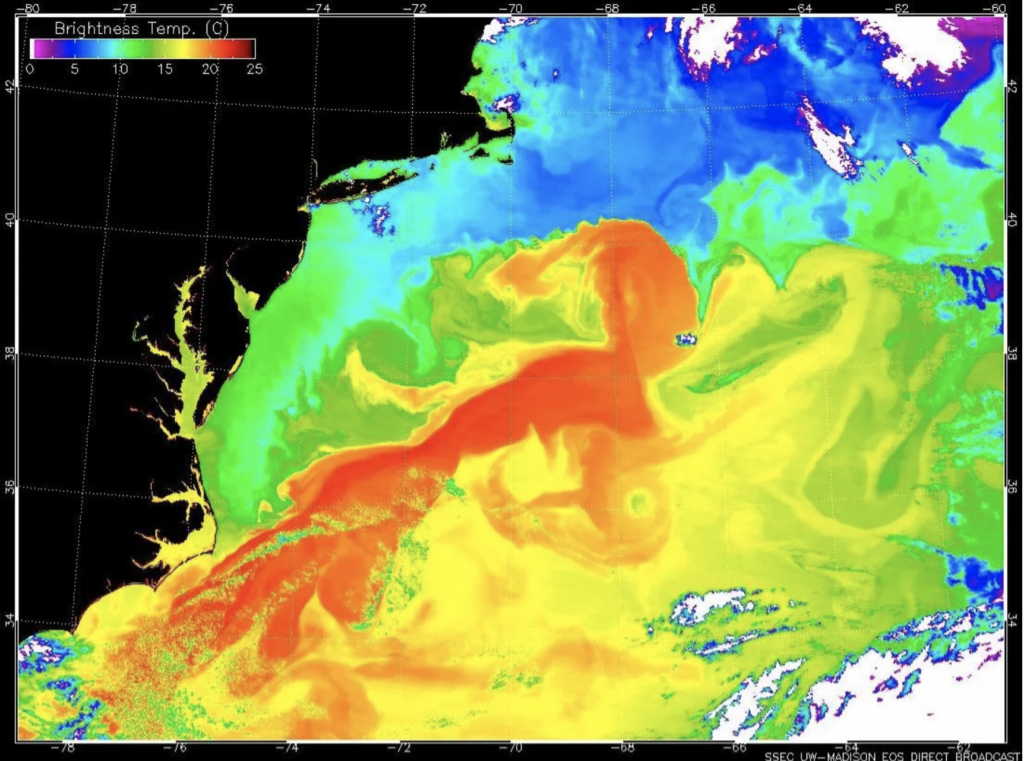
Yesterday, 44 of the world’s leading climate scientists issued a stark warning in an open letter, shedding light on an alarming issue that could impact life on Earth in ways many of us can’t fully grasp: the potential collapse of the Atlantic Ocean’s circulation, also known as the Atlantic Meridional Overturning Circulation (AMOC). This vital ocean system drives major climate patterns and supports marine ecosystems. Without it, the consequences could be catastrophic. For too long, politicians have ignored the warnings from climate experts. While this may partly be due to challenges in science communication, the time to start listening was yesterday. The time to act is now.
What’s happening with the AMOC?
For decades, the AMOC has been weakening, primarily due to the effects of global warming. While this process may sound abstract, its effects are anything but. AMOC plays a crucial role in regulating the climate of much of the Northern Hemisphere, distributing heat by moving warm water from the tropics northward, and sending cooler water back toward the equator.
What could happen if AMOC collapses?
The scientists warn that continued weakening of AMOC could trigger massive changes in weather patterns. Picture this: extreme temperature shifts, rising sea levels that threaten coastal cities, and widespread disruption to marine ecosystems that millions of people rely on for food and livelihoods. These aren’t distant possibilities but real outcomes that we could face within our lifetimes.
Professor Peter Ditlevsen, one of the lead authors, predicts that AMOC could reach a tipping point as early as 2057. He warns that countries like Ireland and the UK could begin to experience climates similar to northern Norway, with far-reaching consequences. “This is not a low-probability event,” he stressed. “This isn’t something you can easily adapt to.”
What’s Being Done?
In their letter, the scientists made an urgent appeal to the Nordic Council of Ministers: “We urge the Nordic Council of Ministers to treat this risk with the seriousness it deserves.” Their call to action is clear: more research on AMOC shutdowns is urgently needed to better understand the timelines and risks.
While the letter’s tone is measured, the gravity of the signatories’ credentials cannot be overlooked. This isn’t just another scientific debate; these are some of the most respected climate experts in the world, and they are collectively saying the risk has been “greatly underestimated.”
Why should we care?
The current prevailing view in our society is that we must work to achieve prosperity through progress and growth. This often brings unwanted consequences, like social dislocation or environmental degradation. The Inner Development Goals are a great example of how this mentality needs to change in order to achieve the targets set out by the UN Sustainable Development Goals (SDGs). They provide us with the framework needed to shift our mentality towards empathy, resilience, and collaboration, empowering us to take meaningful action and drive progress towards achieving the SDGs. Together we can genuinely make a difference and push for action. We need to start viewing ourselves as a society, as part of nature. We are intrinsically connected, and despite what lobbyists would like us to think, we are not separate from nature. We are literally destroying ourselves.
This is why this isn’t just a science problem, it’s a survival problem. Our planet’s systems are interconnected, and a failure in one as critical as the AMOC could have a domino effect on global food security, economies, and human life itself.
The warnings are clear, and the scientists are practically shouting from the rooftops. Now, it’s up to policymakers, international leaders, and all of us to listen and act. The stakes couldn’t be higher, and the time to respond is now.
What Has ZWAI Done?
In recent years, ZWAI has made a significant number of presentations and submissions in which we showed the multiple connections between human societies’ massive over-exploitation of the Earth’s non-living and living components, our excessive consumption, growth of intensive animal-farming, continuing production of huge quantities of waste (including emissions of greenhouse gases), breaching of the planetary boundaries, and destruction of biodiversity, are leading to climate crisis which may be almost irreversible.
See, for example, on our website our submission on soil, our plea for sustainability and our submission in response to the proposed Biodiversity Action Plan. All of the indications are that the Earth, together with ourselves and the many other living species with which we share the planet, are heading towards major climate chaos, but this most recent warning by climate scientists has underlined the urgent need for a complete transition to a zero waste society, to a state of living in harmony with the Earth’s resources.
Conclusion: What Does Waste have to do with the AMOC and Greenhouse Gas Emissions?
While many view waste as mere discarded materials, it actually represents a significant resource that can exacerbate greenhouse gas emissions if we fail to embrace circular economy and zero waste principles. For example, The UNEP Food Waste Index Report 2024 highlights that food waste generates 8-10% of global greenhouse gas emissions, nearly five times more than the aviation sector. This significant impact underscores the urgency of addressing waste management in the context of climate change and its effects on systems like the AMOC, which you can read more about here.
What can you do?
While large-scale change often feels out of our hands, we can all play a role in advocating for policies that prioritise climate action and sustainability. From supporting renewable energy initiatives to holding leaders accountable for their climate promises, our voices matter. The first step is staying informed and spreading awareness about the dangers we’re facing.
The collapse of the AMOC is not a distant, abstract theory—it is a real and growing threat. The time to act is now.
